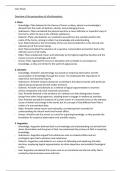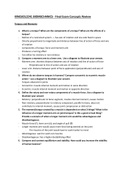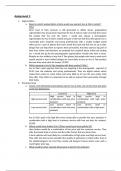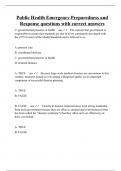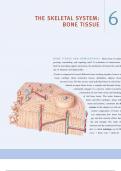Cato Sluyts
Overview of the perspec5ves of all philosophers:
1. Plato:
- Knowledge: Plato believed in the theory of Forms or Ideas, where true knowledge is
derived from the realm of abstract, eternal, and unchanging Forms.
- Substances: Plato considered the physical world as a mere reflec5on or imperfect copy of
the Forms, which he saw as the ul5mate substances.
- Dialec5c: Plato used dialec5c as a method to ascend from the sensible world to the
realm of the Forms, aiming to aFain true knowledge and understanding.
- Soul: Plato believed in the immortality of the soul and considered it as the eternal and
ra5onal part of the human being.
- God: Plato postulated the existence of a supreme, transcendent and perfect God as the
ul5mate source of all reality.
- Ra5o: Plato emphasized reason and ra5onality as the highest cogni5ve facul5es and the
means to access knowledge and truth.
- Senses: Plato regarded the senses as decep5ve and unreliable in accessing true
knowledge, as they are limited to the world of appearances.
2. Aristotle:
- Knowledge: Aristotle's epistemology was based on empirical observa5on and the
accumula5on of knowledge through the senses. He emphasized the importance of
experience and reasoned inquiry.
- Substances: Aristotle viewed substances as exis5ng in the physical world, with par5cular
objects being composed of both maFer and form.
- Dialec5c: Aristotle used dialec5c as a method of logical argumenta5on to examine
various viewpoints and reach reasoned conclusions.
- Soul: Aristotle believed in the existence of a ra5onal soul that dis5nguishes human
beings from other living organisms, enabling them to engage in intellectual ac5vi5es.
- God: Aristotle posited the existence of a prime mover or unmoved mover as the ul5mate
cause of mo5on and change in the world, but his concept of God differed from Plato's
no5on of a transcendent deity.
- Ra5o: Aristotle valued reason and ra5onality, considering them essen5al for
understanding the natural world and human affairs.
- Senses: Aristotle saw the senses as crucial for acquiring knowledge, as they provide the
founda5on for empirical observa5on and scien5fic inquiry.
3. Augus3ne:
- Knowledge: Augus5ne believed that true knowledge and understanding are derived from
divine illumina5on and the grace of God. He emphasized the primacy of faith in acquiring
knowledge.
- Substances: Augus5ne argued that substances exist as created en55es and are
con5ngent upon God's existence and sustenance.
- Dialec5c: Augus5ne used dialec5c as a means of defending and explaining Chris5an
doctrine, employing logical argumenta5on to refute objec5ons and establish theological
truths.
- Soul: Augus5ne considered the human soul as an immaterial and eternal en5ty that is
created by God and seeks union with Him.
, Cato Sluyts
- God: Augus5ne's philosophy centered on the existence and aFributes of God,
emphasizing divine omnipotence, omniscience, and the role of God as the source of all
reality.
- Ra5o: Augus5ne recognized the importance of reason and philosophical inquiry, but he
subordinated reason to faith, considering it secondary to the illumina5on of divine truth.
- Senses: Augus5ne acknowledged the role of the senses in perceiving the physical world,
but he cau5oned against their poten5al to lead to distrac5ons and tempta5ons.
4. Thomas Aquinas:
- Knowledge: Aquinas believed in the compa5bility of reason and faith. He posited that
human reason can lead to certain truths, while faith provides access to divine revela5on.
- Substances: Aquinas dis5nguished between primary substances (individuals) and
secondary substances (universal categories). He integrated Aristotelian metaphysics with
Chris5an theology.
- Dialec5c: Aquinas used dialec5c to engage in scholas5c debates and defend theological
posi5ons, oTen employing logical argumenta5on and reason.
- Soul: Aquinas followed Aristotle in considering the human soul as the substan5al form of
the body, incorpora5ng both intellect and will.
- God: Aquinas formulated the famous Five Ways, or cosmological arguments, as ra5onal
proofs for the existence of God. He regarded God as the ul5mate cause and sustainer of
the universe.
- Ra5o: Aquinas valued reason and ra5onal inquiry, seeing them as tools for
understanding and interpre5ng both the natural world and divine truths.
- Senses: Aquinas recognized the importance of the senses in gathering informa5on about
the physical world and regarded them as instrumental in the process of acquiring
knowledge.
5. William of Ockham:
- Knowledge: Ockham emphasized empirical knowledge gained through sensory
experience and argued for simplicity and parsimony in explana5ons (the principle of
Ockham's Razor).
- Substances: Ockham rejected the existence of universal substances, advoca5ng for a
nominalist view that denies the objec5ve reality of universals or abstract en55es.
- Dialec5c: Ockham engaged in dialec5cal discussions to challenge prevailing philosophical
and theological posi5ons, oTen employing logical analysis and cri5que.
- Soul: Ockham viewed the human soul as an individual and unique en5ty, dis5nct from
other souls and emphasizing personal responsibility and freedom of choice.
- God: Ockham maintained a strong focus on divine sovereignty and emphasized God's
absolute power and freedom, even challenging the possibility of ra5onally
comprehending God's nature.
- Ra5o: Ockham emphasized reason as a valuable tool for analyzing and understanding the
world, but he also recognized its limita5ons and the poten5al for error.
- Senses: Ockham valued the senses as a reliable source of knowledge, as sensory
experience provides the founda5on for empirical inquiry.
Overview of the perspec5ves of all philosophers:
1. Plato:
- Knowledge: Plato believed in the theory of Forms or Ideas, where true knowledge is
derived from the realm of abstract, eternal, and unchanging Forms.
- Substances: Plato considered the physical world as a mere reflec5on or imperfect copy of
the Forms, which he saw as the ul5mate substances.
- Dialec5c: Plato used dialec5c as a method to ascend from the sensible world to the
realm of the Forms, aiming to aFain true knowledge and understanding.
- Soul: Plato believed in the immortality of the soul and considered it as the eternal and
ra5onal part of the human being.
- God: Plato postulated the existence of a supreme, transcendent and perfect God as the
ul5mate source of all reality.
- Ra5o: Plato emphasized reason and ra5onality as the highest cogni5ve facul5es and the
means to access knowledge and truth.
- Senses: Plato regarded the senses as decep5ve and unreliable in accessing true
knowledge, as they are limited to the world of appearances.
2. Aristotle:
- Knowledge: Aristotle's epistemology was based on empirical observa5on and the
accumula5on of knowledge through the senses. He emphasized the importance of
experience and reasoned inquiry.
- Substances: Aristotle viewed substances as exis5ng in the physical world, with par5cular
objects being composed of both maFer and form.
- Dialec5c: Aristotle used dialec5c as a method of logical argumenta5on to examine
various viewpoints and reach reasoned conclusions.
- Soul: Aristotle believed in the existence of a ra5onal soul that dis5nguishes human
beings from other living organisms, enabling them to engage in intellectual ac5vi5es.
- God: Aristotle posited the existence of a prime mover or unmoved mover as the ul5mate
cause of mo5on and change in the world, but his concept of God differed from Plato's
no5on of a transcendent deity.
- Ra5o: Aristotle valued reason and ra5onality, considering them essen5al for
understanding the natural world and human affairs.
- Senses: Aristotle saw the senses as crucial for acquiring knowledge, as they provide the
founda5on for empirical observa5on and scien5fic inquiry.
3. Augus3ne:
- Knowledge: Augus5ne believed that true knowledge and understanding are derived from
divine illumina5on and the grace of God. He emphasized the primacy of faith in acquiring
knowledge.
- Substances: Augus5ne argued that substances exist as created en55es and are
con5ngent upon God's existence and sustenance.
- Dialec5c: Augus5ne used dialec5c as a means of defending and explaining Chris5an
doctrine, employing logical argumenta5on to refute objec5ons and establish theological
truths.
- Soul: Augus5ne considered the human soul as an immaterial and eternal en5ty that is
created by God and seeks union with Him.
, Cato Sluyts
- God: Augus5ne's philosophy centered on the existence and aFributes of God,
emphasizing divine omnipotence, omniscience, and the role of God as the source of all
reality.
- Ra5o: Augus5ne recognized the importance of reason and philosophical inquiry, but he
subordinated reason to faith, considering it secondary to the illumina5on of divine truth.
- Senses: Augus5ne acknowledged the role of the senses in perceiving the physical world,
but he cau5oned against their poten5al to lead to distrac5ons and tempta5ons.
4. Thomas Aquinas:
- Knowledge: Aquinas believed in the compa5bility of reason and faith. He posited that
human reason can lead to certain truths, while faith provides access to divine revela5on.
- Substances: Aquinas dis5nguished between primary substances (individuals) and
secondary substances (universal categories). He integrated Aristotelian metaphysics with
Chris5an theology.
- Dialec5c: Aquinas used dialec5c to engage in scholas5c debates and defend theological
posi5ons, oTen employing logical argumenta5on and reason.
- Soul: Aquinas followed Aristotle in considering the human soul as the substan5al form of
the body, incorpora5ng both intellect and will.
- God: Aquinas formulated the famous Five Ways, or cosmological arguments, as ra5onal
proofs for the existence of God. He regarded God as the ul5mate cause and sustainer of
the universe.
- Ra5o: Aquinas valued reason and ra5onal inquiry, seeing them as tools for
understanding and interpre5ng both the natural world and divine truths.
- Senses: Aquinas recognized the importance of the senses in gathering informa5on about
the physical world and regarded them as instrumental in the process of acquiring
knowledge.
5. William of Ockham:
- Knowledge: Ockham emphasized empirical knowledge gained through sensory
experience and argued for simplicity and parsimony in explana5ons (the principle of
Ockham's Razor).
- Substances: Ockham rejected the existence of universal substances, advoca5ng for a
nominalist view that denies the objec5ve reality of universals or abstract en55es.
- Dialec5c: Ockham engaged in dialec5cal discussions to challenge prevailing philosophical
and theological posi5ons, oTen employing logical analysis and cri5que.
- Soul: Ockham viewed the human soul as an individual and unique en5ty, dis5nct from
other souls and emphasizing personal responsibility and freedom of choice.
- God: Ockham maintained a strong focus on divine sovereignty and emphasized God's
absolute power and freedom, even challenging the possibility of ra5onally
comprehending God's nature.
- Ra5o: Ockham emphasized reason as a valuable tool for analyzing and understanding the
world, but he also recognized its limita5ons and the poten5al for error.
- Senses: Ockham valued the senses as a reliable source of knowledge, as sensory
experience provides the founda5on for empirical inquiry.

